The Michigan Fireworks Safety Act of 2012, amended in 2024, regulates the use of consumer fireworks, ensuring public safety while allowing celebration. It outlines permitted days, safety guidelines, and enforcement measures to balance recreational use with community well-being.
Overview of the Law
The Michigan Fireworks Law 2024, under the Fireworks Safety Act, regulates the sale, possession, and use of fireworks. It permits consumer fireworks from June 29 to July 5, 11 a.m. to 11:45 p.m., and on select holidays like New Year’s Eve. Low-impact fireworks, such as sparklers, are allowed year-round. The law aims to balance public safety with traditional celebrations, ensuring adherence to safety guidelines and local ordinances to minimize risks and disturbances.
Key Updates for 2024
The 2024 updates to Michigan’s fireworks law include extended permitted use dates from June 29 to July 5, with specific time frames from 11 a.m. to 11:45 p.m. Enhanced safety regulations and stricter enforcement of local ordinances aim to reduce disturbances and ensure compliance. Additionally, new guidelines for public displays require liability insurance and municipal authorization, focusing on minimizing risks and environmental impact while preserving the tradition of celebrating with fireworks.
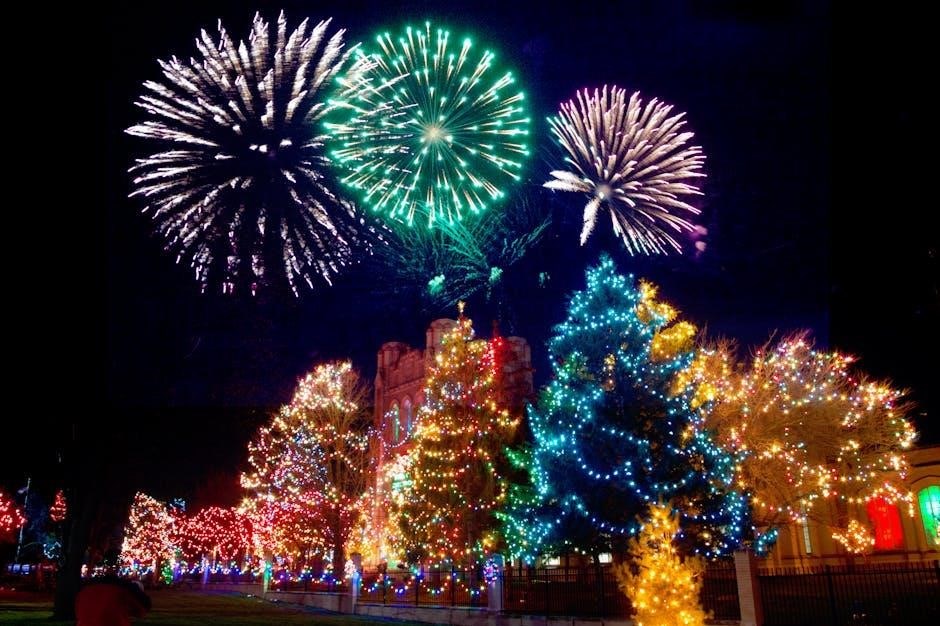
Legal Definition and Classification of Fireworks
Michigan law classifies fireworks into three categories: Consumer Fireworks, Display Fireworks, and Novelty items, each with specific regulations and permitted uses under state guidelines.
Consumer Fireworks vs. Display Fireworks
Consumer fireworks are designed for personal use, such as sparklers and small pyrotechnics, while display fireworks are large-scale devices used in public shows. Michigan law differentiates these categories, with consumer fireworks permitted during specific dates like June 29 to July 5, and display fireworks requiring special permits and professional oversight. This distinction ensures safety standards and regulates usage for both personal and communal celebrations under the Michigan Fireworks Safety Act.
Prohibited Fireworks Under Michigan Law
Michigan law prohibits certain hazardous fireworks, including firecrackers, cherry bombs, and M-80s, due to their potential for harm. These items are classified as illegal explosives and are not permitted for consumer use. Only fireworks meeting Consumer Product Safety Commission (CPSC) standards are allowed, ensuring safer celebrations. Display fireworks, typically used in large public shows, require special permits and professional handling, further restricting their access to the general public under state regulations.
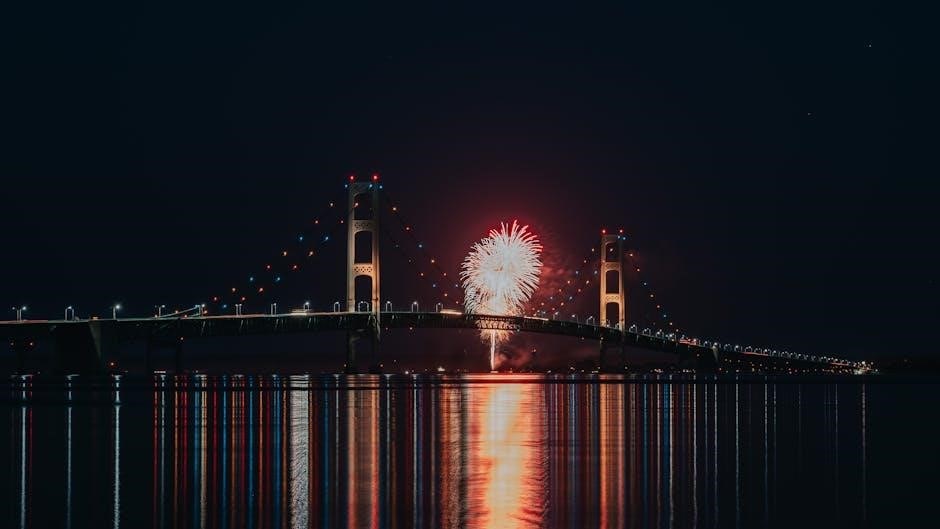
Permitted Use of Fireworks in Michigan
Michigan allows consumer fireworks like sparklers and novelties, with specific permitted days and hours. Use is generally allowed from June 29 to July 5, between 11 a.m. and 11:45 p.m. Official details provide further guidance on legal usage.
Designated Time Frames for Fireworks Use
Under Michigan law, consumer fireworks can be used from June 29 to July 5, between 11 a.m. and 11:45 p.m. Additionally, fireworks are permitted on New Year’s Eve from 11 a.m. on December 31 to 1 a.m. on January 1. These time frames ensure public safety while allowing celebration. Exceptions may apply based on local ordinances, so it’s essential to check municipal rules before use. Official guidelines provide detailed restrictions.
Approved Locations for Fireworks Display
Fireworks in Michigan can only be discharged on private property with the owner’s consent, ensuring safety and compliance. They must be at least 30 feet away from structures, vehicles, and flammable materials. Public spaces like parks, schools, and beaches typically prohibit fireworks unless authorized by local permits. Municipalities may impose stricter rules, so checking local ordinances is essential. Always follow state and local guidelines to avoid violations. Refer to the official law for detailed location restrictions.

Safety Regulations and Guidelines
Mandatory safety measures include keeping water nearby and avoiding fireworks near flammable materials. The Michigan Fireworks Safety Act requires adult supervision and prohibits use under the influence of alcohol or drugs.
General Safety Tips for Fireworks Use
Always maintain a safe distance from flammable materials and keep water nearby. Ensure adult supervision and avoid fireworks near children or pets. Never use fireworks while under the influence of alcohol or drugs. Michigan law prohibits discharging fireworks in crowded areas or near buildings. Use only legal, CPSC-certified consumer fireworks, and follow the manufacturer’s instructions. Avoid modifying or combining fireworks, as this can lead to dangerous accidents. For detailed guidelines, refer to the official Michigan Fireworks Law 2024 PDF.
Specific Rules for Low-Impact and Consumer Fireworks
Michigan law classifies low-impact fireworks, such as sparklers and snaps, as novelties, which are exempt from permits and can be used year-round. Consumer fireworks, including roman candles and fountains, require adherence to designated time frames. Use is restricted to June 29 through July 5, from 11 a.m. to 11:45 p.m. These rules ensure public safety while allowing festive celebrations. For full details, consult the Michigan Fireworks Law 2024 PDF.
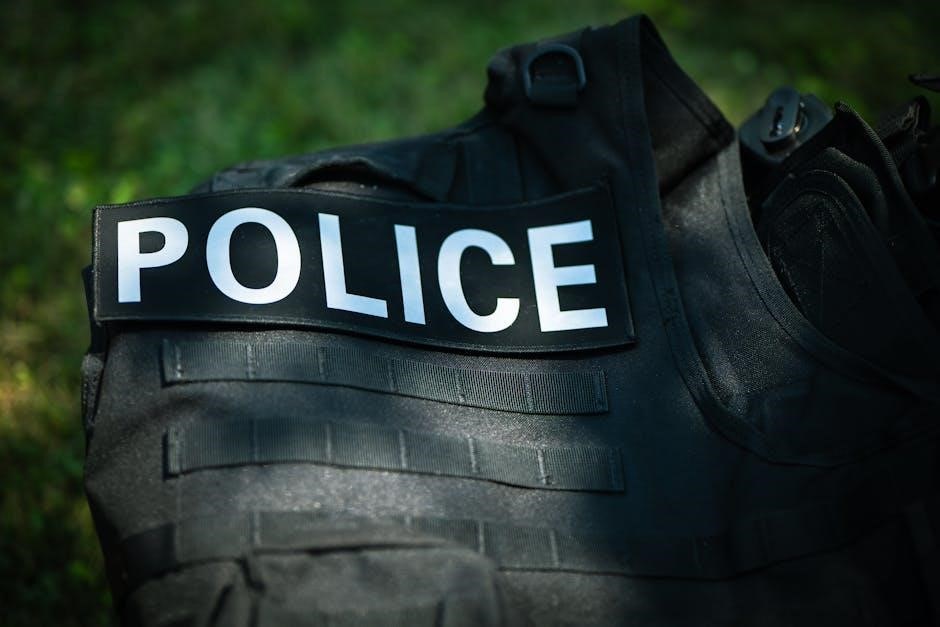
Penalties and Violations
Violations of Michigan’s fireworks law can result in fines up to $500 for first offenses and $1,000 for subsequent violations, with possible jail time. Liability for damages or injuries may also apply. For detailed penalties, refer to the Michigan Fireworks Law 2024 PDF.
Fines and Legal Consequences for Misuse
Misusing fireworks in Michigan can result in fines up to $500 for first offenses and $1,000 for repeat violations. Jail time may also be imposed. Liability for damages or injuries caused by illegal fireworks use can lead to additional legal consequences, including civil lawsuits. Authorities enforce these penalties to ensure public safety and compliance with state regulations. For more details, consult the Michigan Fireworks Law 2024 PDF.
Liability for Damages or Injuries
Under Michigan law, individuals using fireworks can be held liable for damages or injuries caused by misuse. Property damage, personal injury, or fatalities resulting from illegal or reckless fireworks use may lead to civil lawsuits. Insurance coverage may not apply if fireworks are used illegally, leaving individuals financially responsible. The law emphasizes accountability to protect communities and ensure responsible fireworks use. For detailed information, refer to the Michigan Fireworks Law 2024 PDF.
Local Ordinances and Municipal Regulations
Michigan municipalities may impose stricter fireworks regulations than state law. Local ordinances can ban certain fireworks or restrict usage times. Check local rules to ensure compliance and avoid penalties.
County-Specific Rules and Restrictions
Michigan counties often enforce stricter fireworks regulations than state laws. For example, Charlevoix Township prohibits consumer fireworks except on designated holidays. Local ordinances may restrict usage times or ban certain devices. Violations can result in fines or legal action. It’s essential to check county-specific rules before using fireworks to ensure compliance and avoid penalties. Some counties also require permits for public displays, further emphasizing the need to familiarize oneself with local regulations.
How Local Laws Differ from State Regulations
Local ordinances in Michigan often impose stricter fireworks rules than state laws. While state law permits fireworks on specific holidays, counties like Charlevoix may restrict usage to fewer days or prohibit certain types entirely. Municipalities may also set earlier curfews or ban fireworks in densely populated areas. These variations highlight the importance of checking both state and local regulations to avoid violations and ensure compliance with all applicable laws.
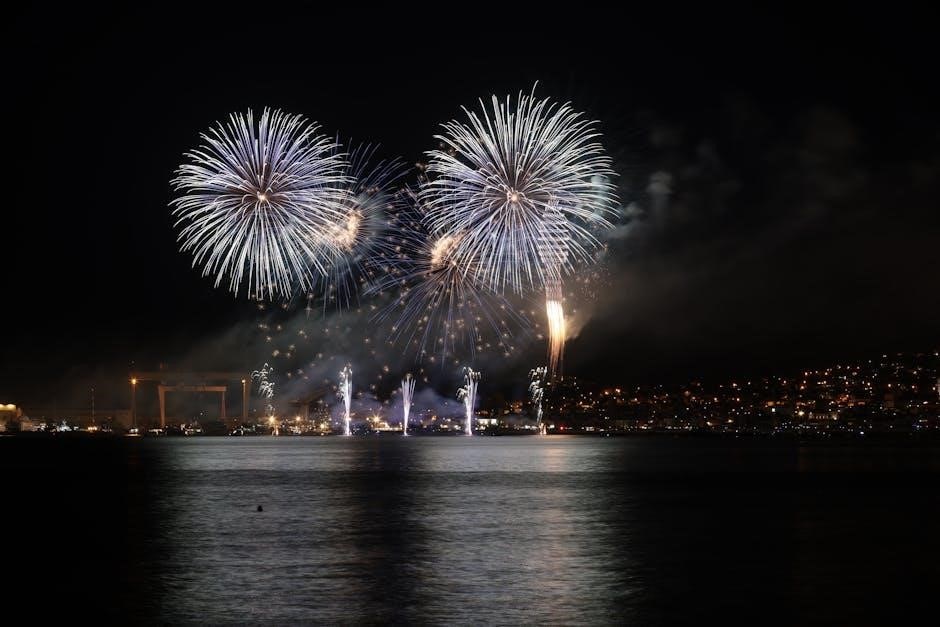
Environmental and Noise Considerations
Michigan’s fireworks laws address environmental impacts, such as noise disturbances and air quality concerns, while balancing public safety and celebratory traditions, ensuring responsible usage.
Impact on Wildlife and Air Quality
Michigan’s fireworks law addresses concerns about noise disturbances and air pollution from fireworks, which can disrupt wildlife habitats and degrade air quality. The law regulates the use of fireworks during specific hours and in designated areas to minimize their environmental impact. It also encourages the use of eco-friendly alternatives and imposes restrictions on fireworks that emit excessive pollutants. These measures aim to protect both wildlife and public health while allowing controlled celebrations.
Noise Restrictions and Quiet Hours
Michigan’s fireworks law establishes specific quiet hours to minimize noise disturbances. Fireworks can only be used between 11 a.m. and 11:45 p.m. from June 29 through July 5, and on New Year’s Eve from 11 a.m. December 31 to 1 a;m. January 1. These restrictions aim to balance celebration with community peace. Local ordinances may further limit hours, so residents are encouraged to check municipal rules to avoid violations and ensure compliance with state and local regulations.
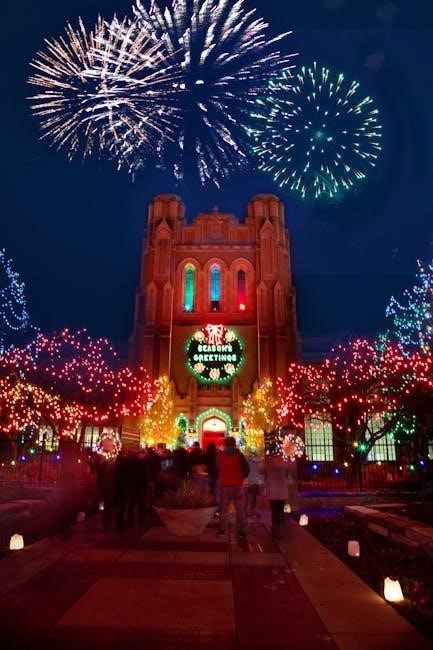
Insurance and Liability Requirements
Michigan requires liability insurance for public fireworks displays, ensuring coverage for potential damages or injuries. This mandate safeguards both organizers and spectators, aligning with state regulations.
Insurance Coverage for Fireworks-Related Incidents
Michigan law mandates liability insurance for fireworks-related incidents, covering damages or injuries. Policies must specifically address firework usage, with coverage extending to property damage and personal injury. Insurance providers offering such policies must comply with state regulations, ensuring adequate protection for both organizers and bystanders. This requirement applies to public displays and private events, with coverage typically valid during designated fireworks periods. Failure to secure proper insurance may result in legal consequences or event cancellation.
Liability Insurance for Public Displays
Michigan law requires organizers of public fireworks displays to obtain liability insurance, with minimum coverage amounts specified by state regulations. This insurance must cover potential damages or injuries resulting from the event. Policies must be obtained from state-approved providers, ensuring compliance with legal standards. Failure to secure adequate liability insurance can result in event cancellation or legal action. This requirement ensures financial protection for both organizers and attendees, aligning with public safety goals.
Public Safety and Emergency Measures
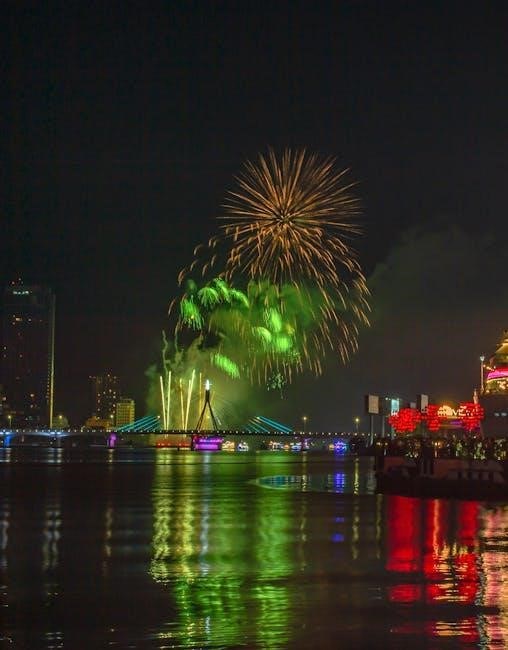
Michigan’s fireworks law emphasizes emergency preparedness, requiring organizers to have response plans and coordinate with local fire departments to ensure public safety during displays.
Emergency Response Plans for Fireworks Accidents
Michigan’s 2024 fireworks law mandates detailed emergency response plans for accidents, including coordination with local fire departments, immediate first aid availability, and clear communication strategies. Organizers of public displays must ensure rapid access to medical services and fire suppression resources. Liability insurance is often required to cover potential damages or injuries, ensuring financial accountability for incidents. These measures aim to minimize risks and ensure prompt, effective responses to emergencies during fireworks events.
Fire Department Guidelines for Fireworks Safety
Michigan fire departments enforce strict safety protocols for fireworks displays, ensuring compliance with the 2024 law. They require permits for public shows, conduct site inspections, and mandate minimum safety distances from spectators. Firefighters are trained to handle fireworks-related incidents, and displays must follow NFPA 1123 standards. Departments also monitor noise levels and prohibit fireworks in high-risk areas. Their role is crucial in preventing accidents and ensuring public safety during celebrations.
Where to Find the Official Michigan Fireworks Law 2024 PDF
The official Michigan Fireworks Law 2024 PDF can be accessed on the Michigan government website and through authorized legal distributors for public access and reference.
Official State Websites and Resources
The official Michigan Fireworks Law 2024 PDF is available on the Michigan Government Website and the Michigan Legislature Website. Additionally, it can be accessed through the Bureau of Fire Services and LARA (Department of Licensing and Regulatory Affairs). These resources provide the most reliable and up-to-date information on fireworks regulations. Users can download the PDF directly from these official platforms, ensuring compliance with state laws and safety guidelines. Regular updates are posted to reflect any changes in legislation.
Authorized Distributors of the Law Document
The Michigan Fireworks Law 2024 PDF is distributed through official state channels, including the Michigan Government Website and the Michigan Legislature Website. Additionally, the Bureau of Fire Services and LARA (Department of Licensing and Regulatory Affairs) provide access to the document. These platforms ensure the authenticity and accuracy of the law, making them the most reliable sources for downloading the official PDF. They are regularly updated to reflect the latest legislative changes and guidelines.
Adhering to Michigan’s fireworks laws ensures a safe and enjoyable celebration. Compliance with regulations promotes public safety and responsible use of fireworks throughout the state.
Final Thoughts on Compliance and Safety
Compliance with Michigan’s fireworks laws is crucial for ensuring public safety and enjoying celebrations responsibly. By adhering to designated time frames, safety guidelines, and local regulations, individuals can help prevent accidents and legal consequences. Always prioritize caution and respect for others when using fireworks. Safety measures, such as keeping water nearby and avoiding prohibited items, are essential for a enjoyable experience. Remember, responsible use ensures both personal and community well-being during festive events.

